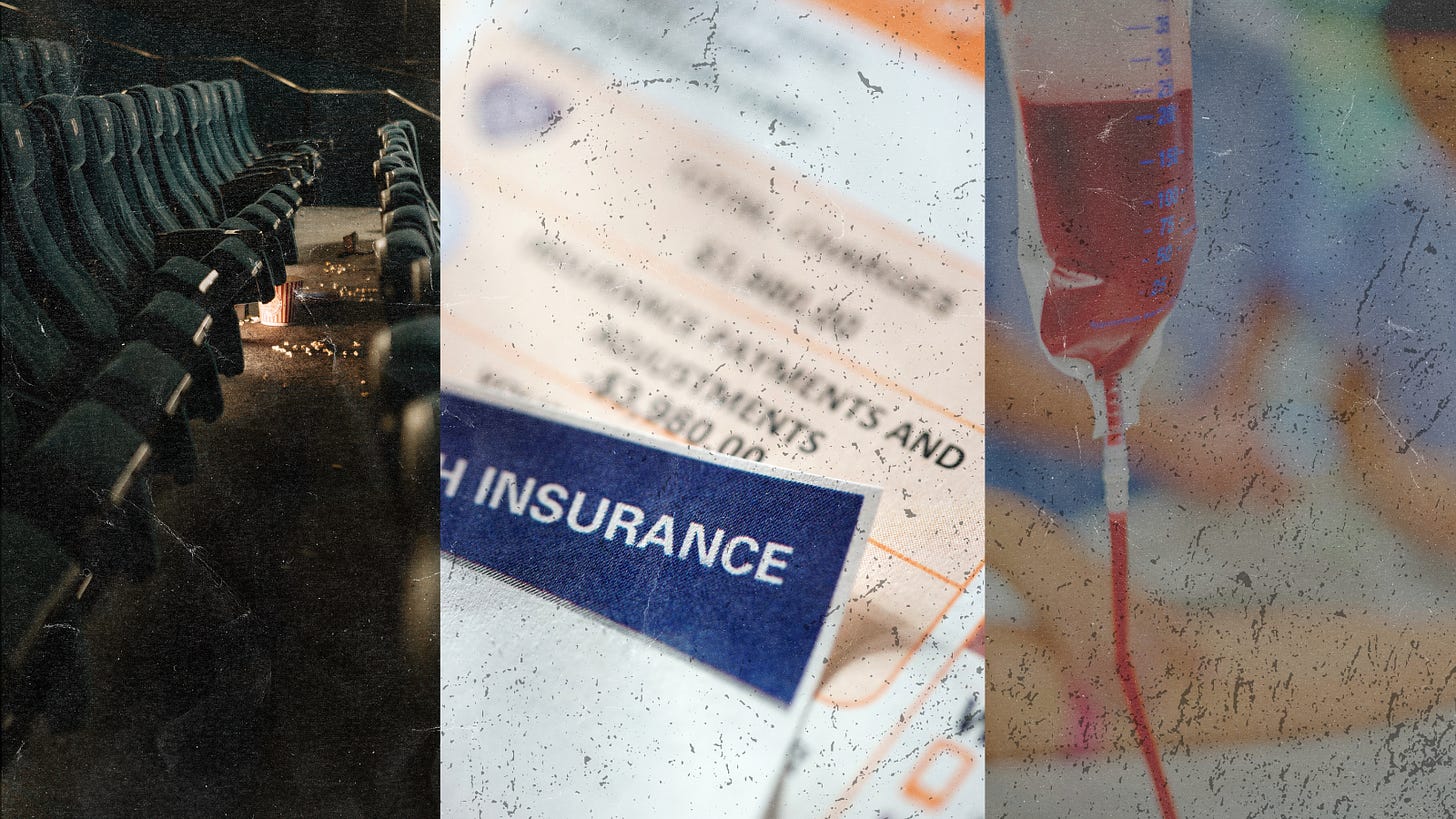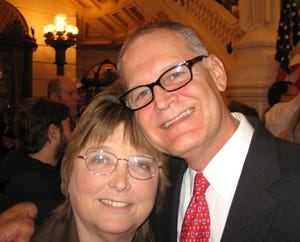16 years ago, my story was told in Michael Moore's documentary "Sicko." I still struggle for the health care I need
When “Sicko” was released in 2007, my hopes were high that my family might get some relief from the stress of securing health care.
The story filmmaker Michael Moore told about us wasn’t unique. We had insurance, but the co-pays, deductibles, premiums, and all the other out-of-pocket costs buried us. Though we begged, borrowed and did everything short of stealing to stay afloat, we were bankrupted.
It was a powerful story in that film, but it was devastating in our lives.
In the fight for health policy reform, and certainly to make a successful movie, it was important to choose members of a family like ours as the poster children. Because we were like so many other Americans fighting to get health-care access, our story represented the trauma many millions of people faced. As I told audiences I spoke to about health policy, “My husband and I were in ‘Sicko’ not because we are unique. We were in ‘Sicko’ because we were not unique.”
But our story did not start with “Sicko.” We fought to get care for many years prior to the movie, and we’re still fighting 15 years after the film came out. It is humiliating and exhausting to work hard, pay for health insurance, and yet still not have the coverage or the cash on hand to get the care we need when we need it.
From my husband’s first open heart surgery in 1991 to my most recent hospitalization in 2022, I’ve had to watch bills grow larger and our assets shrink to the point that we live as if we’d never owned a home, as if we’d never owned an R.V., as if we might never be worthy of the respect of our peers and even our grown children.
In 2006, literally on the eve of my husband Larry’s third open heart surgery, we were pushed to the financial brink by a $600 medical debt sent to collection. The ensuing garnishment not only stained our financial records, it rendered us unable to afford our health insurance benefits. Bankruptcy was our only option to retain health coverage at my job. Larry was too ill to work.
Bankruptcies are the kind of stain that never fades. Just as I was raised that bankruptcy is wrong and only taken by those who are irresponsible with money, I knew people around me saw me as a flawed person. At the toughest, scariest moments of our lives, our efforts to protect ourselves with health insurance failed us so miserably that we were essentially alone.
On July 17, 2007, I testified to the U.S. House Judiciary Committee about medical debt and bankruptcy faced by insured Americans. A Harvard law professor, and leading expert on bankruptcy, now U.S. Sen. Elizabeth Warren sat beside me on the witness panel. As I testified, I heard her sniff. She leaned over to me and said, “That was the most powerful Congressional testimony I have ever heard.” She wrote me a message just days afterward:
Donna,
Please call me Elizabeth. People who share foxholes should be on a first name basis.
I'm pushing everywhere I can. I've been sending your powerful testimony to everyone who might be in a position to help, and I'll keep writing about it.
It was a brave act of citizenship to testify about something so painful. With more people like you, I know we can win this fight.
Stay in touch.
EW
I often feel like I have all the signs and symptoms of PTSD, caused by our health-care system, and yet with no time to drop my guard, I fumble on, facing my own death with a mixture of longing and loneliness. I have gone to sleep every night for the past 30 years worrying about money and bills.
Post-“Sicko,” I worked hard. I worked really hard. I traveled to advocacy events all over the country and worked for a nursing union. My health took a back seat, as I was determined we would someday regain the respect money and property create in our society. We moved five times in five years to support the work of health reform and promote “Sicko.” Michael Moore once told me he thought I had seen the movie more times than he had. My last count was 85. His last viewing count is unknown to me, but I know the film collected more than $35 million in worldwide box office and video sales.
My health didn’t hold up. Chronic, serious anemia wasn’t treated until my gastric bleed was diagnosed, requiring massive infusions of iron. Then there was MRSA, a bacterial infection, and sepsis following the bleed. That almost killed me in 2015.
We were gutted again financially, and I couldn’t work much for a while. Friends and acquaintances helped so often they got tired of helping, and we were tired of asking. I was tired of burdening my husband with my health issues and costs. I cannot help thinking the stress of three decades of health system trauma has contributed to mental health issues as well as my physical dysfunction.
My husband’s health has been stressed, too. With our aging ailments and need for maintenance and preventive care, costs for co-pays, supplies and medications can be significant. Medicare coverage helps tremendously, but we are required to carry supplemental and Part D drug plans, though Medicare can only negotiate drug prices on a limited number of drugs.
The health insurance companies are deeply entrenched in the Medicare markets through Medicare Advantage plans, and those entrenchments threaten to damage Medicare even as they embolden and enrich the private health-insurance industry. The profits are dear, as a friend of mine once said. I just wish our lives were, too.
Since appearing in Michael Moore's 2007 documentary film, SiCKO, about the broken, profit-driven U.S. healthcare system, Donna Smith has worked tirelessly to promote an expanded and improved Medicare For All health care system.






I was glad to have known you, I was glad to have met you at the 2008 Strategy Conference. I don't have a medical license; but I am an activist, wrote many songs voicing concerns over the healthcare crisis in USA (our <so called> world's best care. Having done what you did with SiCKO, I see a hero https://www.youtube.com/watch?v=fDiWDpaH-Oo . Mariah Carey cover Hero. I saw you in photo with Wendell Potter. He is very much a hero. Seemingly had it made with Cigna; risked losing everything by becoming a whistle blower.
Donna,
We must all thank you and Larry for having the continuous courage to tell the world about your personal health problems and your experiences in the system. And all the while being active in the movement for health care justice to the best of your abilities. For your continued health, Marilyn Albert